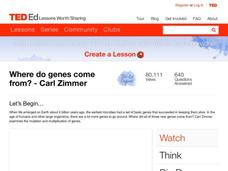SciShow
The Science of Men
Learn about the history of dudes, and a new theory about deep voices in this new episode of SciShow News. You know, science... bro... stuff.
SciShow
The Science of Men
Learn about the history of dudes, and a new theory about deep voices in this new episode of SciShow News. You know, science... bro... stuff. Hosted by: Hank Green
SciShow
Barbara McClintock: Great Minds
Hank tells us about another great mind in science - Barbara McClintock won the Nobel Prize in Physiology for her discovery of mobile genetic elements and remains the only woman to receive an unshared prize in that category.
SciShow
Why Fava Beans Can Kill You
For some people, fava beans can be deadly. What is it about this little legume that makes it so?
SciShow
What Can You Actually Learn from Your Genome?
Genetic tests can give you advice about what lifestyle, diet, and level of exercise are best for you. But you should take those suggestions with a grain of salt, because, when it comes to our bodies, our genes aren’t so much an open...
SciShow
What Can You Actually Learn from Your Genome?
Genetic tests can give you advice about what lifestyle, diet, and level of exercise are best for you. But you should take those suggestions with a grain of salt, because, when it comes to our bodies, our genes aren’t so much an open...
Curated Video
The Genes We Lost Along the Way
Our DNA holds thousands of dead genes and we’ve only just begun to unravel their stories. But one thing is already clear: we’re not just defined by the genes that we’ve gained over the course of our evolution, but also by the genes that...
SciShow
The Girl Who Never Grew Up
The human body generally grows in a predictable pattern, but in one rare case, one American girl essentially remained a toddler her entire life.
SciShow
4 Ways Humans Are Still Evolving
When we think about evolution, we typically think about big changes that happened long ago, but we humans are still evolving!
JJ Medicine
JAK-STAT Signaling Pathway
JAK STAT Signaling Pathway Lesson: Ligands, Receptors, and Importance in Disease. Hey guys! In this lesson, you will learn the JAK STAT signaling pathway, the ligands that activate the pathway, the cell surface receptors involved in the...
MinuteEarth
Why Bird Penises Are So Weird
Thanks to 23andMe for sponsoring this video! https://www.23andme.com/minuteearth Male birds have the largest genital diversity of any class of animals because their sex chromosomes make it easy to pass male-helping mutations down the...
Curated Video
What Is Cystic Fibrosis | Health | Biology | FuseSchool
Cystic fibrosis is a genetic disease. It is caused by a defective gene on one of the chromosomes which has been inherited from the parents. The severity varies greatly from person to person, and largely depends on how much the lungs are...
IT'S HISTORY
Between the Sexes - Sports Legend Ewa Klobukowska | THE COLD WAR
Ewa Klobukowska was a successful Polish athlete and she set several records during her career. When it came to her qualification for the Olympic Games in Mexico City 1968, she had to be tested to determine her biological sex. The tests...
One Minute History
007 ALS - One Minute History
ALS, or Amyotrophic lateral sclerosis, is a rare disorder that involves the death of neurons that control voluntary muscles. Descriptions of the disease date back to the early 19th century. French neurologist Jean-Martin Charcot was the...
Curated Video
How Do People Develop a Stutter?
Kings, scientists, and musicians alike have all been known to stutter. It can make speaking in front of crowds even more nerve-wracking, but is anxiety the root cause? Spoiler: probably not.
Amoeba Sisters
Mutations: The Potential Power of a Small Change
Are the only mutants you know Ninja Turtles or X-Men? The video explains both gene mutation and chromosome mutation. It includes the subtypes of mutations for each major type, the times when mutations are more likely to happen, and the...
Howard Hughes Medical Institute
The Y Chromosome
Forward and backward, it's all the same! Scientists recently discovered the y chromosome's palindrome nature suggests it's possible to for the y chromosome to recombine with itself! An animation resource gives viewers insight into the...
Teacher's Pet
DNA Replication
It takes about 800 hours to replicate an average-sized human chromosome of single linear DNA. The video introduces the concept of DNA replication. It briefly explains the concepts of leading strands and lagging strands.
TED-Ed
Where Do Genes Come From?
No, you didn't get your genes from the local clothing store. Learn where they really come from by watching this video as it explores how the genes found in all plants and animals today have arisen over billions of years of mutations from...
Amoeba Sisters
DNA Structure and Function
Chromosomes come in pairs and in pears. The video covers DNA structure and function including the parts of the nucleotide and the four bases. It provides examples of cloning, gene regulation, and mutation.
Khan Academy
Variation in a Species
If there are no extenuating environmental factors to ensure competition in a species, then variation is achieved by random mutation. This resource may be more useful after viewers are introduced to the concepts of alleles and the...
PBS
The Two People We're All Related To
Is it possible all current lineage trace back to one male and female? Mitochondria DNA suggest just that! A lesson with this interesting perspective on genetic heredity explains how all human DNA connects to a single male and female in...
SciShow
Why We Age - And How We Can Stop It
As we get older, we age, our bodies and minds deteriorate, but this isn't true of all species. The video begins with why we age and what biological processes cause aging. Then it covers research on worms, mice, and other animals that...













